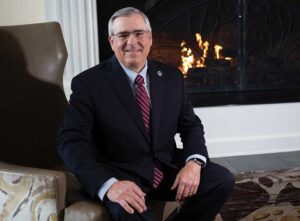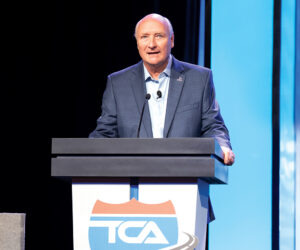Little did anyone know that the 82nd annual convention Truckload 2020: Orlando would provide the last bit of “normality” for the Truckload Carriers Association this year. Just after the convention ended, the COVID-19 pandemic hit the world — as the saying goes — like a ton of bricks. Everyone hoped the pandemic would be short-lived, but that hasn’t been the case. TCA Chairman Dennis Dellinger suddenly found himself leading an Association by means of emails, texts, telephone calls, and virtual meetings. And lead he did. In his third “chat,” Chairman Dellinger brings members up to date on the Association’s accomplishments of the past two months, touches on key industry issues such as a proposed highway bill, talks about how trucking has been thrust into the spotlight as a result of the pandemic, and closes with a word of encouragement as the industry continues to face the unknowns of dealing with an unprecedented pandemic.
Mr. Chairman, you are now halfway through your term. Give us an update on how you think things are going and what is on the agenda during the last half of your term.
Our work at TCA has continued much the same as that of our industry. My agenda this year was broad and included engagement, image, and advocacy. As an industry deemed vital, our drivers have been lifelines for many communities throughout our nation when other industries were forced to step back. Our drivers have been thrust in the limelight and have been recognized as heroes. It is now our responsibility to keep the momentum going and determine how to get publicity outside our industry for those recognition programs we operate within the Association. COVID-19 has forced us to look at how we operate daily and how we remain relevant as an Association. The staff has never taken its eyes off the ball as they have overcome obstacles that have allowed them to communicate and deliver pertinent information critical to the membership. COVID-19 will force us to find alternatives to accomplish our desired goals for the balance of the year, but I stand confident the staff and membership will prevail.
As we speak, you are in Asheville, North Carolina, for the annual officers’ retreat. What precautions did you take to ensure the safety of the participants?
Let me begin by saying I was excited that we were able to hold the meeting in Asheville and showcase the beautiful mountains of North Carolina and its illustrious greenery. We had much discussion prior, on both the practicality of holding the meeting and the safety of those participating. There were ongoing communications for months between TCA staff and those responsible at the Biltmore properties. The staff at the Biltmore was great to work with, proposing their respective guidelines in accordance with those mandated by (North Carolina) Gov. (Roy) Cooper’s office. As a result, we met in an outdoor environment, under a tent, and wore masks when leaving our seats. Everyone handled the requirements in stride, allowing us to focus on the task at hand.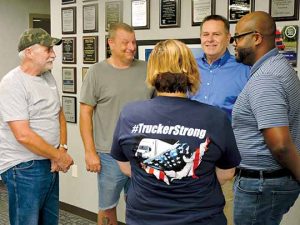
In June, TCA held its annual Safety & Security Meeting as a virtual rather than in-person event. The number of registrants was far more than the attendance when the conference is held in person. Share with members some of the highlights of the event.
The interest received from our virtual event was tremendous. In fact, this meeting generated nearly 1,200 registrants. Some of the highlights included comments from Federal Motor Carrier Safety Administration Acting Administrator Jim Mullen in our Fireside Chat, moderated by Dave Nemo, host of Radio Nemo on SiriusXM’s Road Dog Trucking. Our “Safety in the Round” conversations, though virtual, still provided beneficial insights, and the CEO Panel, in which I participated with some of my fellow officers, generated a lot of buzz. Honestly, the overall meeting was a success and demonstrated to us that there is still a need for industry interaction, even with COVID-19 spreading across the country.
Both the annual Call on Washington and the Fall Business Meeting were scheduled for September but because of the COVID-19 crisis, the Call on Washington has been canceled and the Fall Business Meeting will be a virtual event. Since they can’t come to Washington, would you encourage TCA members to contact their Congressional delegations via phone, text, email, or mail?
One of the things that COVID-19 has shown this nation is how instrumental the trucking industry and its professional drivers have become as we battle this virus. While our nation deals with
recovery efforts, Congress is certainly still pressing forward on meaningful legislation such as highway reauthorization and stimulus packages that have supported many carriers during this pandemic. In noting that, it is important our members continue to foster their relationships with those that govern. We have always insisted that we have a story to tell, and it is more important today than ever before to tell it. Developing alternative methods of communication outside of an annual visit to Washington has proven to be extremely beneficial toward fostering relationships with our friends on Capitol Hill, so we can best communicate the effect any potential legislation will have on our industry. In fact, once this pandemic is behind us, I would encourage inviting your senators and representatives to visit your terminals to help them gain a better understanding of how the rules and regulations affect your company.
What are some of the discussion points they should make in those communications to legislators?
To start, any discussion should begin with the desire to have a multiyear infrastructure bill to replace the FAST Act and make the Highway Trust Fund become more self-sustainable. One thing this pandemic has demonstrated is that the freight delivery model is more expedient with less traffic on the roads, and any infrastructure plan should come with the ability to repair our infrastructure so that traffic can move more freely. Additionally, movement on hair testing as an alternative to urine-based drug testing protocols is essential to support our industry’s zero-tolerance policy. Other issues like suspending the FET on equipment purchases and finding ways to increase truck parking availability would be extremely beneficial to the truckload sector of our industry. Quite frankly, once this issue lands on the desks of our membership, the new rules concerning hours of service will be upon us. These rules have been developed based upon the data generated by ELDs and should be viewed as a mere start, not an end. These devices are telling a story, and flexibility is the answer.
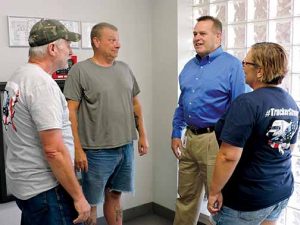
As the pandemic lessens and life begins to return to normal, how can the trucking industry sustain the extremely positive image that has been created during recent months?
There is no doubt the professional truck drivers, who represent the tip of the spear in the fight against COVID-19, have received unprecedented and well-deserved accolades for their willingness to deliver the supplies our nation desperately needs. But, it is up to us to continue that positive momentum. Taking advantage of such image-building programs like Highway Angel and Driver of the Year have proven that we can continue providing our drivers with the kudos they so richly deserve. I think carriers will find similar programs at their state trucking association as well in an effort to continue recognizing our drivers who refused to give in to this virus.
The House Transportation & Infrastructure Committee recently passed the Investing in a New Vision for the Environment and Surface Transportation in America (INVEST in America) Act that includes huge expenditures for roads and bridges. This bill was later incorporated within the larger Moving America Forward Act recently passed by the House. While this legislation is unlikely to pass the Senate in its current form, is this at least a start in coming up with a highway reauthorization bill to replace the FAST Act that expires at midnight September 30?
It is important that these conversations continue to permeate throughout the halls of Congress, but we must still be cognizant of the fact that the House and Senate are widely divided when it comes to some of these issues. If you remember the last time we transitioned from MAP-21 to the FAST Act, there were 13 continuing resolutions passed prior to settling on what will be expiring at the end of September. We have been given every inclination that any highway reauthorization that gets passed will most likely traverse down the same road we experienced last time around.
The INVEST in America Act includes an amendment that would raise the minimum liability insurance requirement from $750,000 to $2 million. What is TCA’s position on this increase?
TCA policy is to support a minimum level of liability insurance, though what that level of insurance is remains to be seen. It is fair to point out, the level has not been raised since its introduction in 1980, and most carriers have reported receiving increases to insurance premiums over the past few years. However, the increase to $2 million seems random at best, and the reality is that any changes to the minimum levels of insurance should accompany tort reforms, so that nuclear verdicts can be addressed.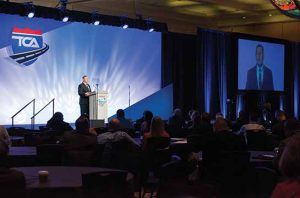
A push to suspend the Federal Excise Tax (FET) on Class 8 trucks has garnered support from 55 Democrats. Does TCA support the suspension — or complete deletion — of the FET on Class 8 tractors?
TCA does support the suspension of the FET as a response to the COVID-19 global pandemic and assistance with any federal recovery efforts. We believe the suspension of the FET would serve as an extremely effective policy to spur the sales of newer, cleaner trucks, which would retain jobs in the trucking sector and help rebuild the economy. Due to the pandemic, truck sales are expected to plummet by 50% in 2020. In order to help jumpstart the economy as the virus ebbs, suspension of the 12% FET would immediately spark the purchase of new heavy duty trucks and trailers, as well as assist in saving nearly 7.8 million American jobs in trucking.
On a personal note, the COVID-19 pandemic has dealt a blow to our country and our beloved trucking industry.” Would you like to offer a word of encouragement to Americans and especially members of the trucking community?
I wish I could be more original in offering up encouragement without being overly simplistic, but it is only faith, knowing things will get better, that calms my angst and fear of the unknown we face with the COVID-19 pandemic. Feeling helpless does not allow us to make good decisions in our companies or our Association. Early in the pandemic a co-worker sent me a short video that the author, Jim Collins, sent his readers, which has helped to guide me. Jim shared that if he had one piece of advice during these times, it would be a comment he refers to as the Stockdale Paradox. You must never confuse faith that you will prevail in the end — which you can never afford to lose — with the discipline to confront the most brutal facts of your current reality, whatever they might be. Take time to read about Vice Admiral James Stockdale and the context in which he spoke these words.
Lyndon Finney’s publishing career spans over 55 years beginning with a reporter position with the Southwest Times Record in Fort Smith, Arkansas, in 1965. Since then he’s been a newspaper editor at the Southwest Times Record, served five years as assistant managing editor of the Arkansas Democrat-Gazette in Little Rock and from November 2004 through December 2019 served as editor of The Trucker. Between newspaper jobs he spent 14 years as director of communications at Baptist Health, Arkansas’ largest healthcare system. In addition to his publishing career he served for 46 years as organist at Little Rock’s largest Baptist church.




